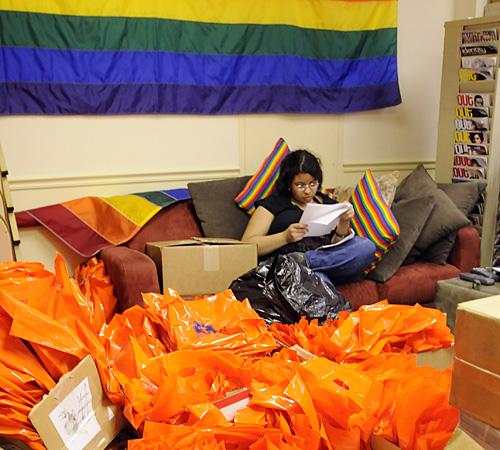LGBT Resources names itself as ‘center’

Shauntel Reed, freshman in LAS, studies on a couch in the Office of LGBT Resources inside the Illini Union, Thursday. The office was filled with boxes of supplies in preparation for the Midwest Bisexual Lesbian Gay Transgender Ally College Conference to b Erica Magda
February 18, 2008
The Office of Lesbian, Gay, Bisexual and Transgender Resources may not know what its official title will be next year but the new name definitely will end in the word “center.”
“(Calling it a center) legitimizes it a little more,” said Casey Blakely, junior in Business and student intern for the Office of LGBT Resources. “Ultimately, we want to get our own house like the cultural houses, and calling it a center makes it sound more official.”
The upcoming switch holds more importance than just the difference between two words, Director Curt McKay said.
“There’s a psychological advantage in becoming a center,” McKay said. “It’s easier to think of us in the same way as you would all the cultural centers.”
LGBT Resources is not the first organization on campus to overhaul its title in hopes of conveying a welcoming message to the community.
Get The Daily Illini in your inbox!
About a year and a half ago, the Bruce D. Nesbitt African American Cultural Center also underwent a name change. The word “center” was swapped into the title instead of the African American Cultural Program, said Nathaniel Banks, director of the center.
“Cultural centers serve a two-fold purpose,” Banks said. “We assist the campus in providing a safe and welcoming environment for students … and the second part is to be a resource to the larger community in general.”
McKay said the Office of LGBT Resources has similar goals in terms of welcoming, including and educating any interested student or community member. Receiving full cultural center status just makes sense, he said.
The name change has been in the works for a few months and hopefully will be official by the beginning of the next academic year, said William Riley, dean of students.
“We thought it was a difficult process but it turned out not to be,” McKay said. “Because it wasn’t about a building and we’re not an academic program, the process is easier.”
To become a center, the office had to have its own budget and prove it is an organized, independent unit under the Office of the Dean of Students, Riley said.
Riley said he made sure the office met those requirements before allowing the naming contest to begin.
McKay took suggestions for the rest of center’s new name through a campus-wide contest that ended Friday. Students had about a week and a half to e-mail ideas for the new name. Signs advertising the contest were posted in residence halls and cultural centers, McKay said. The posters advised students to be “creative, witty, simple, fun, professional,” when brainstorming ideas to submit.
Now that the contest deadline has passed, McKay and a group of five or six students and staff will select the winning suggestion and award its creator $200 for helping the office on its path to recognition as a cultural center.
“The word ‘center’ gives a whole different feel,” McKay said. “Whereas at an office, some people gather to advocate for others, a center is more student focused in terms of students being more empowered.”






